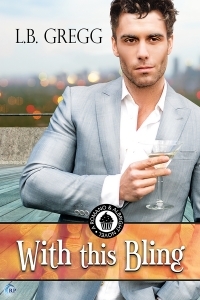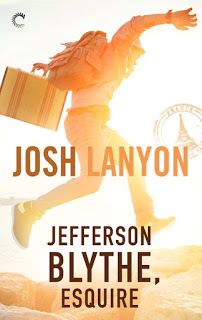This is Not Your Mother's Publishing Career (part 3)
 If you just happened to pop over to the blog today, I’m chatting with L.B. Gregg about how publishing has changed from the good old days. (Although the Good Old Days had their problems too.)
If you just happened to pop over to the blog today, I’m chatting with L.B. Gregg about how publishing has changed from the good old days. (Although the Good Old Days had their problems too.) The conversation began over at LoveBytes, continued at LB’sblog and we’re finishing up here—and hoping to get some other insights and perspectives.
Platform and persona
Once upon a time a writer’s “persona” amounted to a decade-old staged photograph on the back of a book jacket. Raymond Chandler with his cat. Mary Stewart with her pen. Pearls or elbow patches optional. Now it’s a whole different world.
The problem with the new emphasis on persona is it creates this huge pressure to be out there being social and personable and “on” twenty-four seven -- which is not necessarily the writer temperament. Not everybody is good at making small talk.
L.B. - And ai yi yi, not all of us are good at blogging. I’m very good at small talk and cocktail conversation. I wish there were more opportunities to chat with readers, but I don’t like doing so online. I am uncomfortable with the nature of online commenting and social media. It’s a shit storm on the best of days. I’d rather chat with someone at a conference or signing.
But see, you go to conferences and talk with readers in real life. And, I want to make the point that you were/are a brilliant blogger. You just made the decision not to continue reviewing/blogging once you became an author. And while I miss your blogging, I think that choice to quit reviewing was shrewd.
Once you create this expectation of accessibility and interaction, there really isn’t any way of going back without appearing to withdraw or subtract previously added value.
L.B. - You can go back, but I think if you withdraw once (and I have) the real question becomes whether interaction and accessibility add value to your writing. Because if it distracts or depresses or overwhelms or angers you, then find another avenue.
 Puppy Makes Everything More Interesting
Puppy Makes Everything More InterestingMaybe it’s crucial to set up realistic parameters to start with. Because I started out being Everywhere All the Time, and that was a contributing factor to burnout.
L.B. - You were all over the map. I think finding that one right place, whether it’s Facebook or Twitter or Instagram or what, is better than spreading yourself too thin.
Which I learned, to my cost.
Then there’s the notion of platform in genre fiction. This is an idea that evolved with mainstream publishers hoping to give certain books a marketing edge in a crowded market. So a former police officer writing a police procedural is theoretically going to be more interesting to readers than, say, an ordinary run-of-the-mill author writing a police procedural.
L.B. - Or a housewife writing a romance novel.
Ha! So if you’re a gay man writing something like male/male romance there’s supposed to be this added cachet to your work. But that’s nonsensical. You’ve got to bring more to the table than genitalia.
Um. In a manner of speaking.
L.B. - Not touching that table. No.
I don’t care who you are or what you’re writing, platform is about how the work is marketed. It’s an advertising gimmick. It’s not a substitute for the work. And I think sometimes people are disappointed because they’re leaning very heavily on their credentials, and credentials don’t turn pages, don’t leave readers misty, don’t lead to someone heading straight to your website at midnight and clicking a buy link.
L.B. – Well, true, the notion of platform can and does work against some authors in this flooded market. Does that make sense? There are a lot of people asking for justification. Or offering it. Why do your write x,y, or z when you’re not an authority? Here’s why I write x,y, or z.
I don’t have time or patience for that.
No, it’s boring. It’s pointless. To even ask the question is to miss the point of FICTION.
This concept of “authority” in fiction is a new one, and I believe an ephemeral one. It’s part of that Every Child Gets a Cookie mentality wherein passion and sincerity are supposed to be just as good as talent and craft. We all give lip service to the notion—nobody wants to be the Genre Grinch—but the fact is when it comes to buying books, craft and talent trump enthusiasm and sincerity (or even authority) because what readers want is a great book. Every. Single. Time.
Readers buy books they want to read. Building a readership means you consistently supply the books your readers want to read. If there is such a thing as branding, that’s what it amounts to.
And as for platform, well, readers will support enthusiasm and sincerity and authority, but they’ll do it in different ways. 600 likes on your FB post, for example. I LOVE YOU SO MUCH, AUTHOR X!! but your books are boring, so I usually don’t buy them.
I had an interesting chat with Nicole Kimberling at Blind Eye Books the other day, and she was theorizing that it’s not so much that more books are being published as the slush pile is now largely filtered through DIY publishing. Readers and citizen reviewers have replaced editorial and agent assistants as the new gatekeepers. I think there is a lot of truth to that.
But now I digress. What platform does do—and this is very valuable—it gives you something to talk about besides BUY MY BOOK FOR THE LOVE OF GOD. Original and continual content in the Age of White Noise is an issue. You can’t just keep posting about new reviews or new releases. You have to have something else to talk about. In order to engage with readers, you have to talk to them. And a sales pitch is not conversation.
So the pressure is on to be charming and personable and witty and pleasant and…and…say something interesting.
L.B. – Or I can tell a joke. Or post a photo of a puppy.
 More completely gratuitous puppy
More completely gratuitous puppy LOL. You have adorable puppies.
Then there is branding, which is a big part of—
L.B. - I am not a brand. I’m an author. I say this smugly, with the kind of mustached self importance of a hipster, but I’m not selling as much as I’d like so maybe I need to focus on branding myself.
It just sounds so painful. And distasteful. And…dishonest. Is it me? I don’t want to walk around with a giant sign that reads LB GREGG BOOKS and, IDK, hand out business cards to strangers like I’m witnessing for Jehovah. (can I say Jehovah?)
The thing is…the thing is publishers will try to create a brand for you and sometimes, if you’re not sure who you are yet, you allow that to happen. If if it’s not a good fit? You have to start all over again. The LB Gregg I was when I wrote the first Smithfield books, she’s not the same LB six publishers later. She’s a little less starry eyed and a lot more cautious.
So isn’t it better to define your brand yourself?
L.B. -- I still don’t know what my brand is. But I know what it’s not.
But then I also think too often people are worrying about their tagline and brand before they’ve actually worked out what kind of writer they are. Honestly, I see more authors worrying about promotion than about whether their writing is good enough for prime time.
Is this cynical on their part or are they right? I go back and forth on the question.
L.B.— Well. Look there’s bubble gum music and quality pop, and people buy and enjoy both.
A lot of people buy books based on the ‘cool kid’ word-of-mouth factor (not mentioning any names here—oh fuck that. EL JAMES). The issue is that as a romance author, we’re already viewed as bubble gum writers by the rest of the publishing (and reading) world, and it’s in our best interest to do good work. To focus on craft. Not that I’m the bees knees of romance. Holy no. In truth, I’d love to be a cool kid who sells books based on my incredible promotion machine because there are bills to pay.
Well, I guess it comes back to what you want out of your publishing career. I think people aren’t always honest when they answer this question. Me, I want to continue to do the work I love for a living. I don’t need six hundred “likes” on my posts and I have zero wish to be a celebrity.
 Genre authors as celebrity
Genre authors as celebrity What? Who? Define celebrity in this genre.
I guess we could both name a few of the “celebrity” authors in any given genre. Basically these are the people with name brand recognition (I know!) which translates into earning power.
I mean, being known within your genre doesn’t always translate into earnings. The nutjobs are well known but they usually don’t earn well. And there are those who are highly respected by their peers and reviewers, but they don’t always earn well either. Which of course creates great confusion and frustration.
Success in publishing is not always fair.
Nor is publishing a democracy.
At the same time, celebrity does not always equal success (unless ego-stroking was the primary goal). But maybe again here is where people need to be honest because, not to be the Debbie Downer, most authors will not earn a living at writing fiction. Period. And maybe that doesn’t matter. Maybe you love your day job and being considered one of the cool cats in your publishing circle is all you’re really looking for.
L.B. –I like to believe one can keep on the radar without being an online personality. In this new publishing world, where producing four books a year is considered the bare minimum, keeping readers interested is vital, particularly if you’re not producing four books a year. Free reads, self-publishing the back list, producing audio books, foreign rights—blogging—there are small ways to keep your name on the radar, but you have to be realistic if you’re a) not able to churn out books and b) you suck at promo.
So. I’m not going to buy a Tesla with my earnings any time soon, but I’m okay with that.
I will have my friend J. Lanyon buy me a Tesla.
I wish. And not just about the Tesla. I want to believe you’re right about the promotion side of it, and maybe you are. I do know that I can be out there tap-dancing twenty-four-seven, but three months without a new release, and my sales slump. You have to feed the engine. Or maybe "monster" is a better word.
You also have to be honest with yourself. And I think you have to get informed about the industry. Frustration and anger and depression are a reality, but I think information helps diffuse some of that anxiety.
Or maybe not. But the bottom line is, this is the new publishing reality. This is not your mother’s publishing career. That was then, this is now.
For the moment.
===================================================
BIOS:
L.B. Gregg –When not working from her home in the rolling hills of Northwestern Connecticut, author L.B. Gregg can be spotted in coffee shops from Berlin to Singapore to Panama -- sipping lattes and writing sweet, hot, often funny, stories about men who love men. Buy her books here: www.lbgregg.com
Josh Lanyon – A distinct voice in gay fiction, JOSH LANYON is the multi-award-winning author of nearly seventy stories of male/male mystery, adventure and romance. Josh is the author of the critically acclaimed Adrien English series, including The Hell You Say, winner of the 2006 USABookNews award for GLBT Fiction. Josh is an Eppie Award winner, a four-time Lambda Literary Award finalist, and the first recipient of the Goodreads M/M Romance group's Hall of Fame award. Learn more at www.joshlanyon.com
Published on August 31, 2015 01:00
No comments have been added yet.



